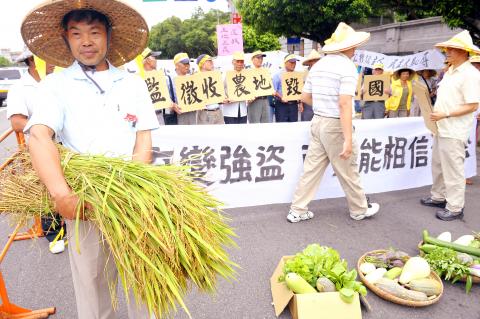More than 100 farmers from Jhubei City (竹北), Hsinchu County, yesterday demonstrated in front of the Presidential Office against a local government plan to expropriate more than 447 hectares of farmland for a high-tech science park project.
Holding up banners that read “When the government becomes the robber, whom should we trust” and “Defend our homes,” more than 100 Jhubei farmers gathered on Ketagalan Boulevard in front of the Presidential Office in Taipei yesterday morning to voice their anger at a project to develop a “Taiwan Knowledge Economic Flagship Park” by expropriating their farmland.
The development project, known as the “Puyu Project” until 2004, was proposed by National Chiao Tung University (NCTU) in 2000 to expand its campus in Jhubei with county government help in acquiring land.

Photo: George Tsorng, Taipei Times
In 2004, the project was renamed, classified as a “major economic project” and expanded to include an area for the high-tech industry.
Although the project started as a plan to expand NCTU’s campus, the Ministry of Education never approved it, so it was gradually turned into a science park development project after several revisions.
“This is purely a development project under the disguise of an NCTU campus expansion plan,” said National Chengchi University Department of Land Economics chairman Hsu Shih-jung (徐世榮), who has long been active in movements for farming rights and against land expropriation. “Initiated by the NCTU, the project is apparently not for the purposes of research and teaching. Rather, it is for high-tech companies founded by NCTU graduates.”
Donghai Community Development Association chairman Chen Yi-hsu (陳義旭) said the plan was initiated by NCTU, but the Hsinchu County Government would be in charge of expropriating the land and then transferring it to NCTU.
Donghai is the name of one of the communities living on land that the government plans to expropriate for the development project.
Chen said most locals are against the land seizure, but neither the county government nor NCTU officials have listened to them.
“One hundred percent of the members of the Jhubei Puyu Self-Help Association are original residents in the area [to be expropriated],” he said. “However, in the planning committee for the development project, only 30 percent [of the planners] are locals, while 70 percent are either land developers or people who have moved [to Jhubei] from elsewhere.”
“The government is using taxpayers’ money to obtain privately owned land for high-tech -companies,” Chen said.
Jhubei Puyu Self-Help -Association chairman Chiu Hung-chun (邱鴻鈞) said that when the land seizure occurs, more than 3,000 households would be forced to leave.
“Where are we going to stay? Are we going to live at the Presidential Office?” he asked.
“The Chinese Nationalist Party [KMT] should not forget why they were defeated by the Chinese Communist Party,” Chiu said. “They were defeated because their policies upset peasants, and therefore the peasants revolted against them.”
Taiwan Rural Front spokeswoman Tsai Pei-hui (蔡培慧) said the area produces more than 3.6 million kilograms of rice a year.
“It’s a major agricultural area for northern Taiwan; the government should not destroy it in the interest of large corporations,” Tsai said.
After the protesters took their petition to the Presidential Office and the Control Yuan, both promised to look further into the issue.
The protesters also announced that more than 1,000 farmers from 12 farming communities currently facing land expropriation would launch an overnight rally in front of the Presidential Office starting on the evening of July 16.

Alain Robert, known as the "French Spider-Man," praised Alex Honnold as exceptionally well-prepared after the US climber completed a free solo ascent of Taipei 101 yesterday. Robert said Honnold's ascent of the 508m-tall skyscraper in just more than one-and-a-half hours without using safety ropes or equipment was a remarkable achievement. "This is my life," he said in an interview conducted in French, adding that he liked the feeling of being "on the edge of danger." The 63-year-old Frenchman climbed Taipei 101 using ropes in December 2004, taking about four hours to reach the top. On a one-to-10 scale of difficulty, Robert said Taipei 101

Nipah virus infection is to be officially listed as a category 5 notifiable infectious disease in Taiwan in March, while clinical treatment guidelines are being formulated, the Centers for Disease Control (CDC) said yesterday. With Nipah infections being reported in other countries and considering its relatively high fatality rate, the centers on Jan. 16 announced that it would be listed as a notifiable infectious disease to bolster the nation’s systematic early warning system and increase public awareness, the CDC said. Bangladesh reported four fatal cases last year in separate districts, with three linked to raw date palm sap consumption, CDC Epidemic Intelligence

Two Taiwanese prosecutors were questioned by Chinese security personnel at their hotel during a trip to China’s Henan Province this month, the Mainland Affairs Council (MAC) said yesterday. The officers had personal information on the prosecutors, including “when they were assigned to their posts, their work locations and job titles,” MAC Deputy Minister and spokesman Liang Wen-chieh (梁文傑) said. On top of asking about their agencies and positions, the officers also questioned the prosecutors about the Cross-Strait Joint Crime-Fighting and Judicial Mutual Assistance Agreement, a pact that serves as the framework for Taiwan-China cooperation on combating crime and providing judicial assistance, Liang

US climber Alex Honnold left Taiwan this morning a day after completing a free-solo ascent of Taipei 101, a feat that drew cheers from onlookers and gained widespread international attention. Honnold yesterday scaled the 101-story skyscraper without a rope or safety harness. The climb — the highest urban free-solo ascent ever attempted — took just more than 90 minutes and was streamed live on Netflix. It was covered by major international news outlets including CNN, the New York Times, the Guardian and the Wall Street Journal. As Honnold prepared to leave Taiwan today, he attracted a crowd when he and his wife, Sanni,